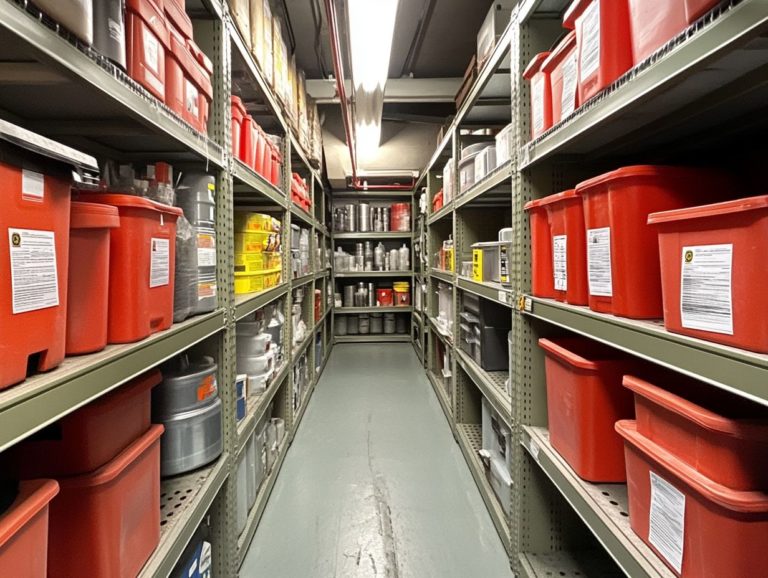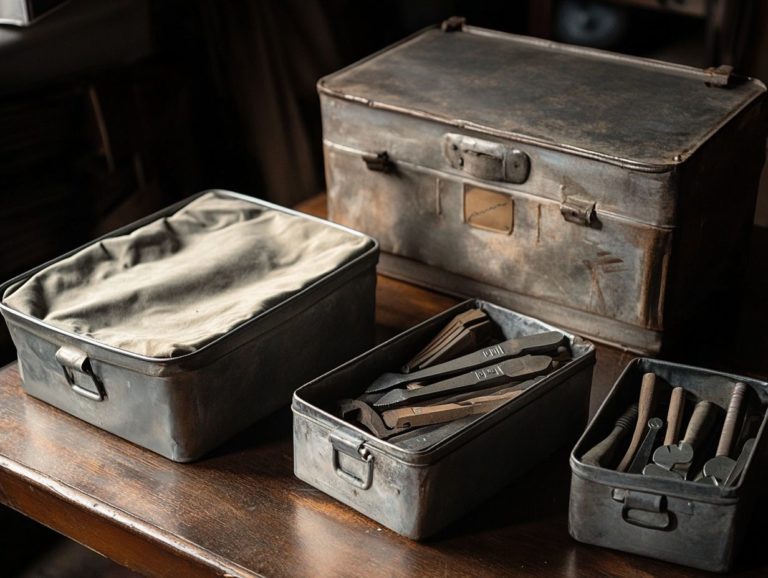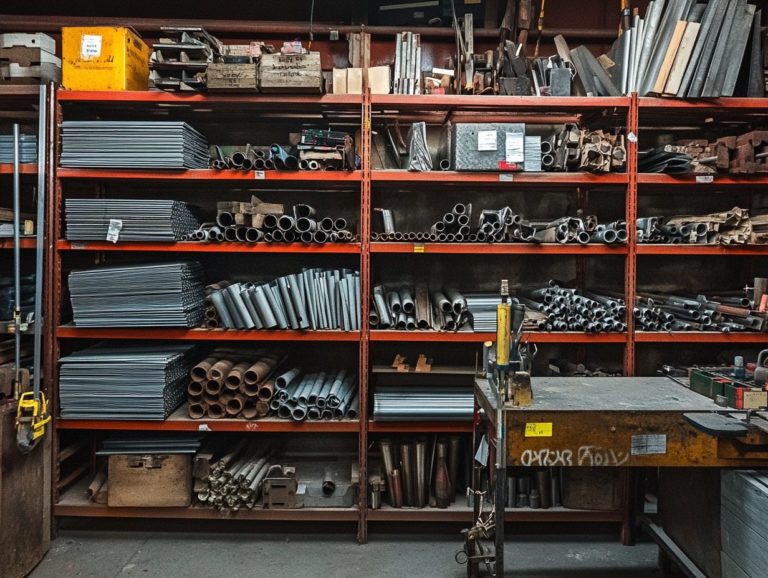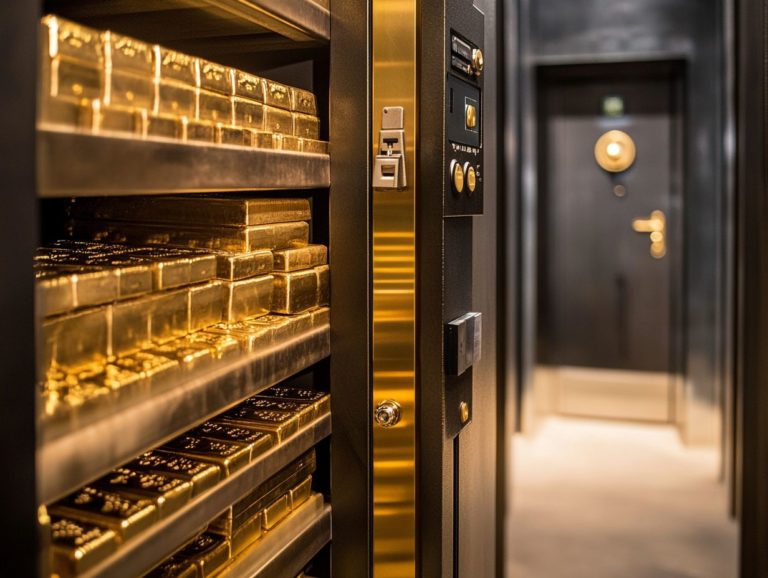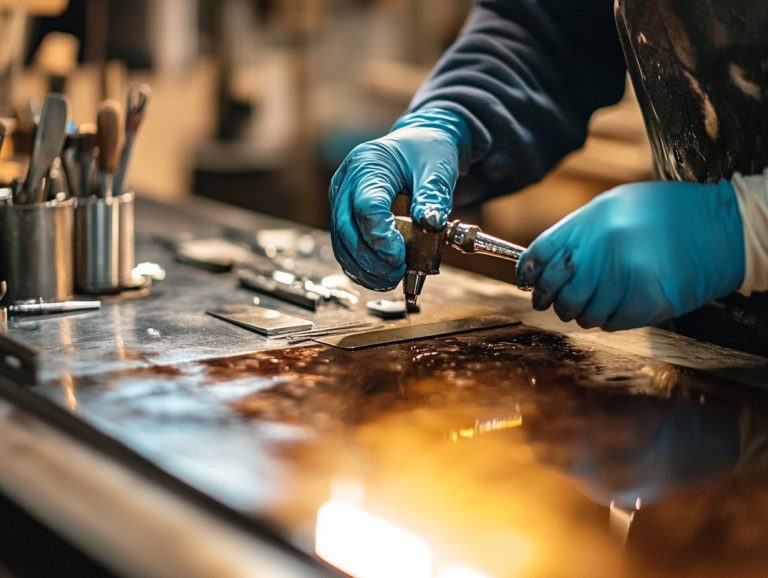Choosing the Right Size Safe for Your Metals
When it comes to safeguarding your valuables, choosing the right size safe is paramount. A well-sized safe not only protects your important items but also ensures they fit comfortably within its confines.
Before making your purchase, consider key factors such as size, material, and locking mechanisms. You ll explore various types of safes and receive guidance on selecting the ideal size for storing metals.
Additionally, you ll find installation and maintenance tips to help keep your safe in prime condition.
Contents
- Key Takeaways:
- Importance of Choosing the Right Size Safe
- Factors to Consider Before Buying a Safe
- Types of Safes
- Choosing the Right Size Safe for Your Metals
- Installation and Maintenance of Safes
- Frequently Asked Questions
- What factors should I consider when choosing the right size safe for my metals?
- What size safe is suitable for storing silver coins?
- Can I use a small safe for storing large amounts of gold bars?
- How do I determine the weight capacity of a safe for my metals?
- Can I place my safe on a second floor or in a basement?
- Do I need a fireproof safe for storing my precious metals?
Key Takeaways:
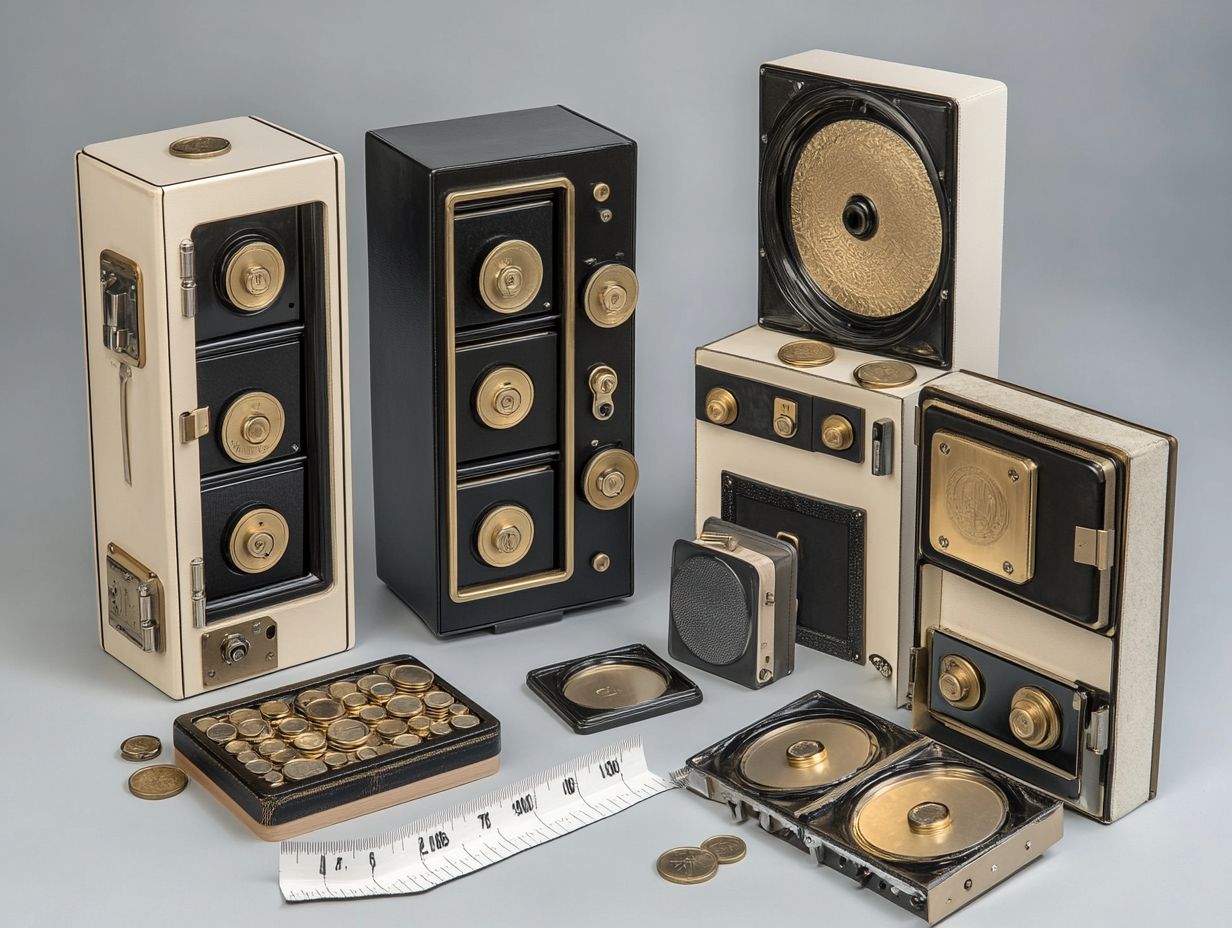
- Protect your valuables by choosing the right sized safe.
- Consider factors such as size, material, and locking mechanisms before purchasing a safe.
- Choose the appropriate size safe for the type and amount of metals you want to store.
Importance of Choosing the Right Size Safe
When safeguarding your valuable possessions, selecting the right size home safe is essential for both security and accessibility. A safe that s too small might leave your critical items exposed, while one that s excessively large could disrupt your space and convenience.
Don’t just think about size. Consider fire and water damage resistance, security features, and safe ratings. Carefully evaluating these elements can ensure maximum protection against thieves. Assessing these aspects gives you the peace of mind you deserve, knowing that your investments whether in gold, jewelry, or important documents are well protected.
Factors to Consider Before Buying a Safe
Before you purchase a safe, there are several critical factors to consider, ensuring it aligns perfectly with your security and convenience needs.
The size options can greatly impact the interior dimensions, allowing you to effectively store personal items like important documents and jewelry. It’s equally important to understand the various locking mechanisms available, such as combination locks and biometric scanners devices that use your fingerprint or face for security to ensure you achieve the desired level of burglary protection.
Installation considerations, such as bolting the safe down for extra security, are crucial for its effectiveness.
Size and Capacity
When you think about securing your valuables, the size and capacity of a safe are absolutely critical, especially for precious metals like gold. A carefully selected safe should fit seamlessly into your space and meet your specific storage requirements, whether you’re stashing away documents, jewelry, or other cherished items.
It s essential to grasp the difference between internal and external dimensions. The external size determines whether the safe will fit into your chosen location, while the internal dimensions dictate how much you can actually store inside. A smaller safe may appear suitable for miscellaneous items, but if it lacks the internal space for larger possessions like firearms or sizable jewelry boxes, it will inevitably let you down.
Opting for a safe with a thoughtfully designed interior layout is crucial. Look for features such as adjustable shelving or compartments to maximize your storage efficiency. Safes come in various sizes, ranging from compact models for small collectibles to larger vaults designed to securely hold a significant number of documents and valuables, ensuring everything is organized and easily accessible.
Material and Construction
The materials and construction of a safe are crucial elements that greatly impact its ability to protect against fire and water damage. Different materials come with varying levels of security, so choosing a robust fire-resistant safe or a waterproof option can help ensure your valuables stand the test of time and unforeseen disasters.
As you explore your options, steel emerges as a popular choice, prized for its strength and durability. It effectively deters unauthorized access while offering substantial fire resistance. On the flip side, composite materials combine high-density fireboard with steel, achieving an ideal balance between weight and protection.
These materials often carry certifications from reputable organizations like Underwriters Laboratories, giving you peace of mind through standardized fire ratings that indicate how long a safe can withstand extreme heat.
With these distinctions in mind, you can make informed decisions that prioritize the safety of your most cherished possessions.
Locking Mechanisms
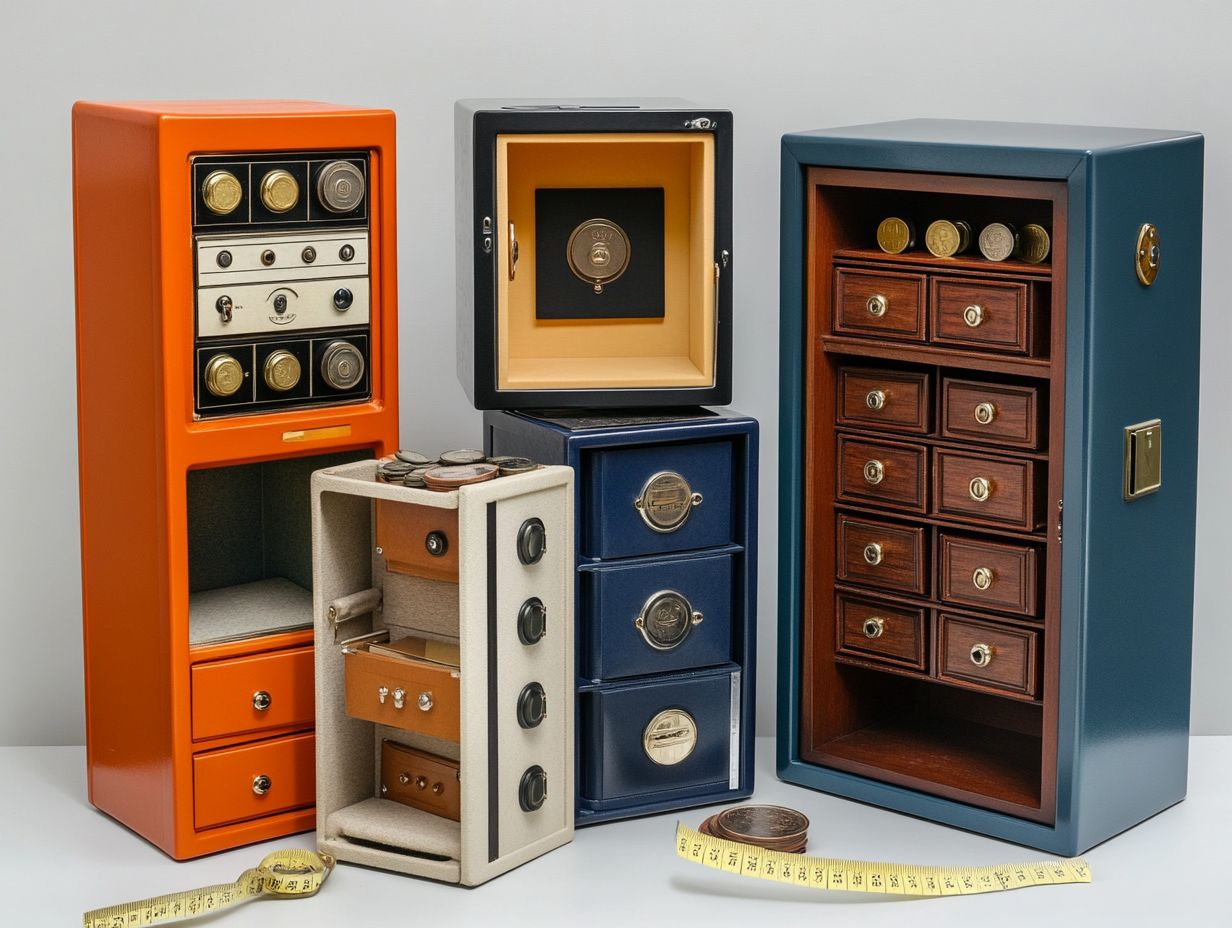
Choosing the right locking mechanism is crucial for burglary protection. Options include traditional combination locks, high-security locks, and biometric scanners.
Each type has its own strengths. Traditional combination locks are reliable, but high-security locks resist tampering.
Biometric scanners offer quick access, but they need regular maintenance. Your choice will impact accessibility and security.
Carefully consider each feature to find the best option for your needs.
Types of Safes
There are various safes, each designed for specific security needs. It’s vital to understand the differences among floor safes, wall safes, standalone safes, and portable safes.
This knowledge will help you make a well-informed purchase that meets your requirements.
Floor Safes
Floor safes are some of the most secure options for protecting your valuables. They can be bolted down to resist theft.
These safes are made to last and resist damage, featuring designs that deter even determined thieves. They also blend into your home’s foundation.
Choose a location that is discreet yet accessible for enhanced security. Look for models with multiple locking mechanisms.
Investing in a high-quality floor safe means protecting your important documents, jewelry, and other valuables.
Wall Safes
Wall safes provide a clever way to secure your valuables. You can hide them behind artwork or furniture for quick access.
They can deter opportunistic thieves by being hidden. However, installation may need specific tools.
If you lack the skills, hiring a professional might add costs. While they are accessible for you, others may find it tricky in emergencies.
Understanding these pros and cons helps you choose wisely based on your security needs.
Portable Safes
Portable safes offer unmatched convenience. They are perfect for securing your valuables while you travel or need temporary storage.
These compact safes come with various security features, including waterproof options. They ensure your personal items stay protected no matter where life takes you.
They are especially beneficial for outdoor enthusiasts, frequent travelers, and anyone attending events where theft is a concern. While their mobility is a great advantage, their security features may not provide the same level of protection as traditional safes.
Keep in mind that portability may reduce storage capacity or the strength of locking mechanisms. Assess your needs before choosing this flexible solution.
Choosing the Right Size Safe for Your Metals
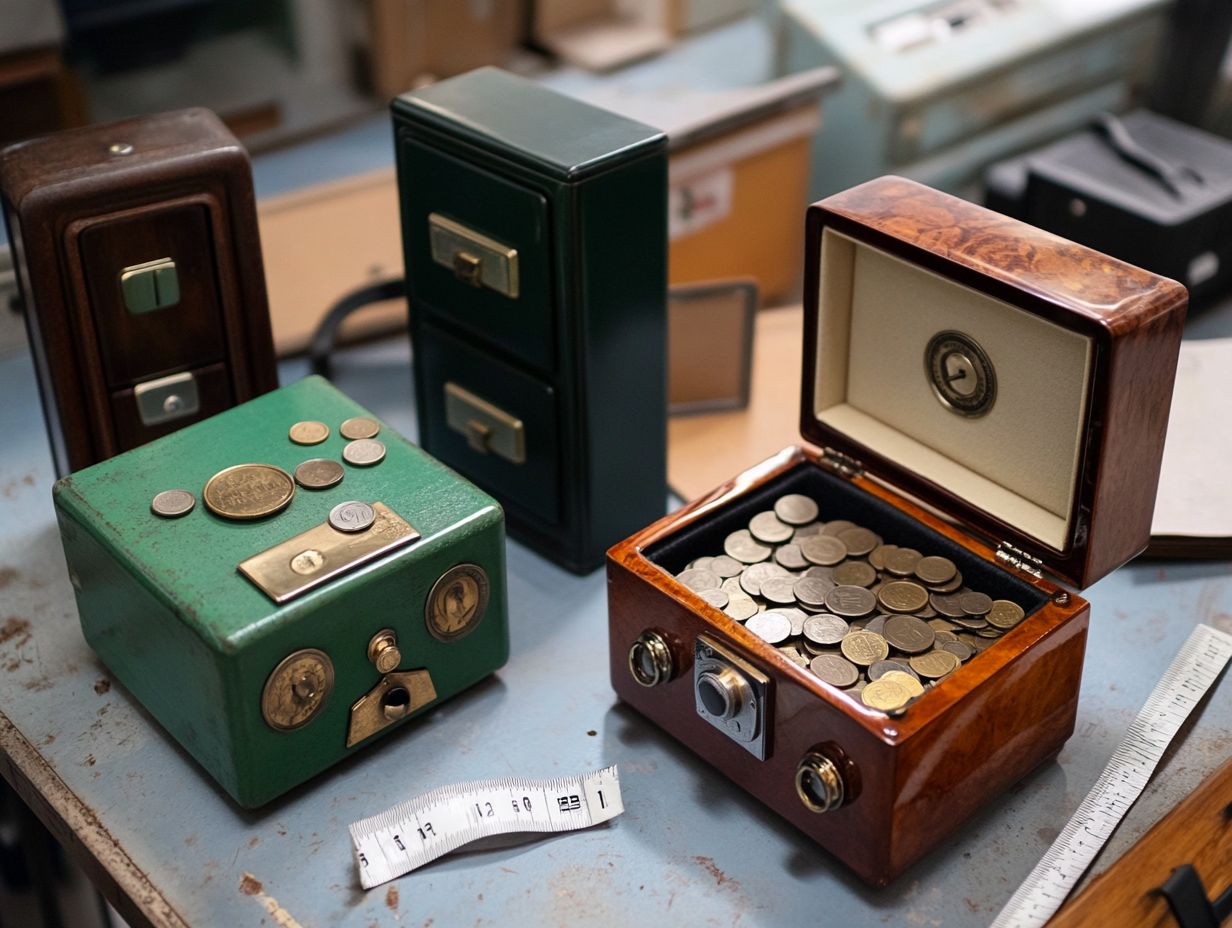
Selecting the perfect size safe for valuable metals like gold or silver requires careful thought. Consider both the types of metals you want to store and their total quantity.
Taking a careful approach to choose the right safe size will ensure your investment is protected while allowing for easy access.
Types of Metals to Store
Understanding the types of metals you plan to store is crucial for choosing the right size and features of your safe. Precious metals like gold and silver have significant value and unique storage needs.
Each metal has specific characteristics that affect its storage requirements. For example, gold is known for its strong value retention and is often a safe choice during economic downturns.
In contrast, silver is more accessible for collectors and investors due to its lower price point. Both metals are vulnerable to theft, so choose a safe with strong security measures.
The physical properties of these metals, such as weight and volume, will help you select the right dimensions for your safe. Make sure your investment is secure but also easily accessible when you need it.
Calculating the Right Size
Calculating the right size for your safe requires assessing both internal and external dimensions. This ensures optimal storage for your most valuable possessions.
Start by cataloging what you plan to store, noting both the dimensions and fragility of each item. For instance, flat storage works well for important documents, while bulkier items like jewelry boxes may need more vertical space.
Remember to consider the safe’s walls, as they reduce usable inner space. Don’t forget the safe’s weight capacity and accessibility when storing heavier items.
For convenience, place frequently used items towards the front. This makes retrieval easier and avoids unnecessary reaching.
Installation and Maintenance of Safes
Proper installation and maintenance of your safe are crucial for its longevity and effectiveness. A well-installed safe boosts security and ensures that you have easy access whenever needed.
Proper Installation Techniques
Using proper installation techniques is crucial for maximizing the security features of your safe. This is especially important when it s bolted down to a solid surface.
Select the right location and ensure the safe is anchored securely to deter potential thieves.
Begin by choosing a discreet yet accessible spot that remains out of sight think along the lines of a closet or a basement. This will help keep unwanted attention at bay. You’ll need tools like a drill, concrete anchors, and a socket wrench for the installation process.
If you’re dealing with certain types of safes, like wall or floor safes, be aware that they require specific mounting techniques to ensure they can’t be easily removed. Remember, securing your safe properly greatly enhances its protective capabilities.
Maintenance Tips for Longevity
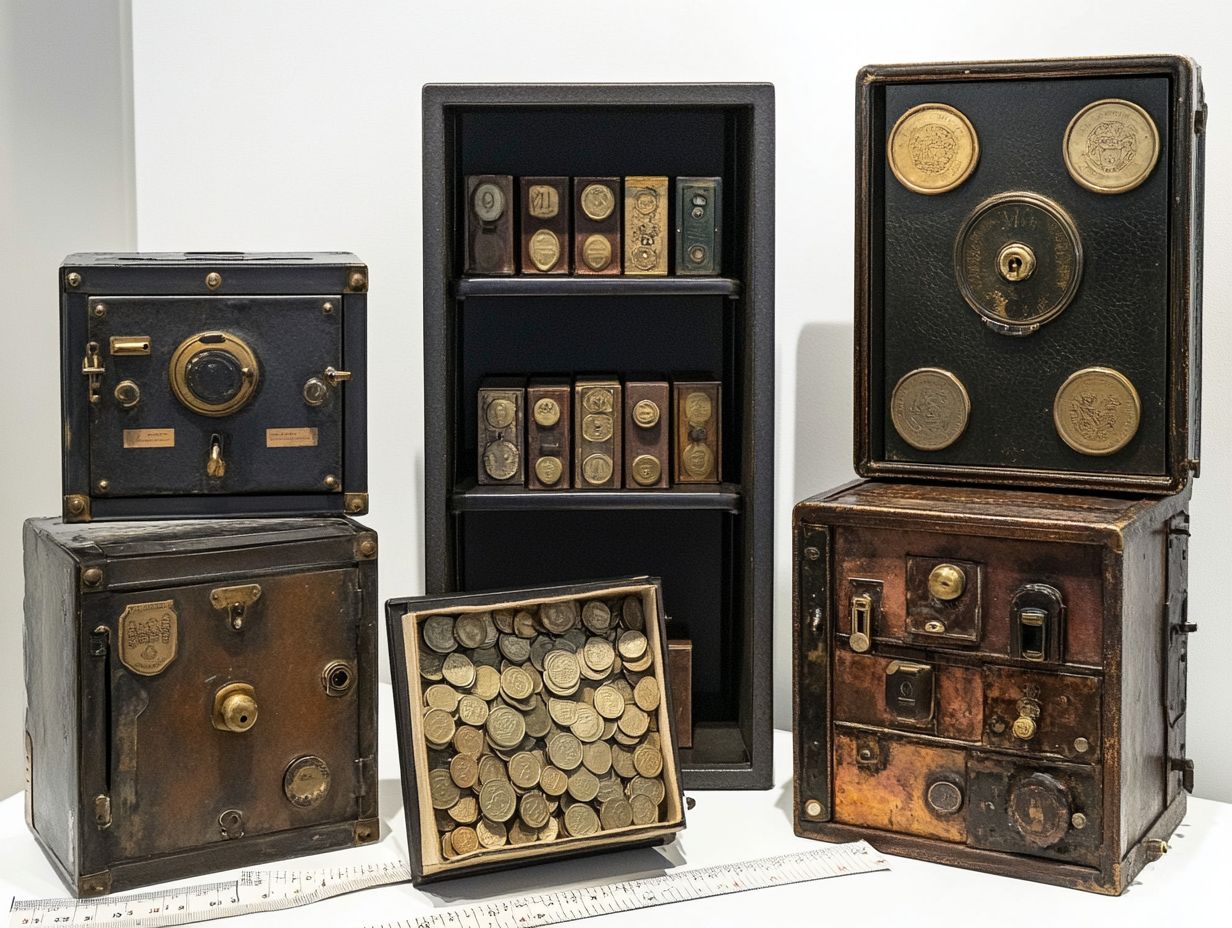
Regular maintenance is essential for the longevity of your safe, especially if it s designed to be fireproof or waterproof. These features shield against environmental damage.
By implementing straightforward care routines, you can ensure that the locking mechanisms and structural integrity stand the test of time.
Make it a habit to check the locks, seals, and outside surfaces regularly. Spotting wear early can save you trouble later.
Keeping your safe clean and free from dust and debris will significantly enhance both its functionality and aesthetics. Use a soft cloth to wipe down the exterior and a mild detergent for any stubborn spots. Avoid harsh chemicals that could harm its finish.
Don t forget to lubricate the locking mechanisms; this will prevent them from becoming stiff or jammed. Prioritizing these maintenance tasks safeguards your safe s security features and extends its lifespan, granting you peace of mind for years to come.
Frequently Asked Questions
What factors should I consider when choosing the right size safe for my metals?
When choosing a safe for your metals, consider the size and weight of your metals, along with any potential future additions to your collection. Evaluate the level of security you need and the space available for the safe.
What size safe is suitable for storing silver coins?
The size of safe required for storing silver coins depends on the amount you possess. Estimate the size by measuring the dimensions of your coins and adding a few inches for extra space. Consider stacking height if you have multiple layers of coins.
Can I use a small safe for storing large amounts of gold bars?
No, it is not advisable to use a small safe for storing large amounts of gold bars. Gold bars are heavy and bulky. A larger safe with a higher weight capacity and thicker walls is essential for securing your investment.
How do I determine the weight capacity of a safe for my metals?
The weight capacity of a safe is usually found in the product specifications or by contacting the manufacturer. Ensure the weight of your metals does not exceed the safe’s capacity to avoid damage to the safe or your items.
Can I place my safe on a second floor or in a basement?
It is not advisable to place a safe on a second floor or in a basement. These areas may lack sufficient structural support to hold the weight of the safe. Transporting a heavy safe to these locations can also be difficult.
Do I need a fireproof safe for storing my precious metals?
While not strictly necessary, choosing a fireproof safe for storing precious metals is highly recommended. It provides an extra layer of protection in case of fire, as these safes are designed to withstand high temperatures and keep the contents safe from damage.










